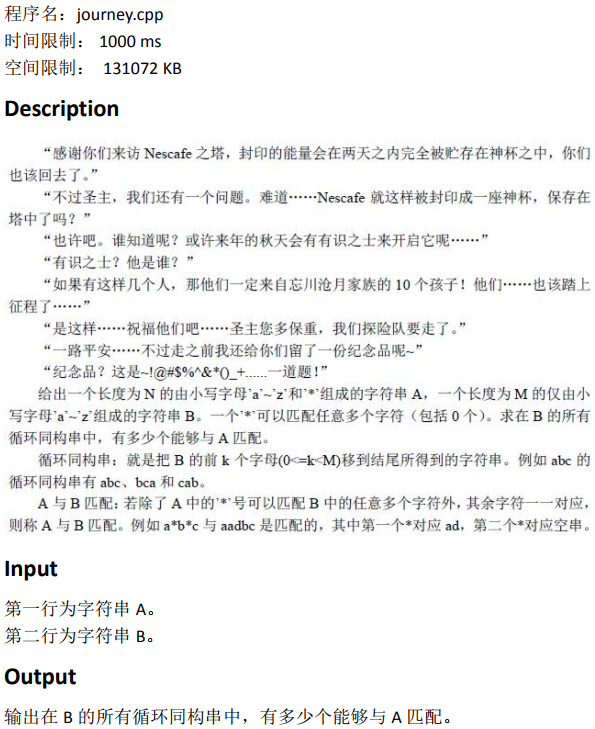Preface
Similarly, see "energy"
subject

Sample Input 1
aaaa
aaaa
Sample Output 1
4
Sample Input 2
a*a
aaaaaa
Sample Output 2
6
Sample Input 3
*a*b*c*
abacabadabacaba
Sample Output 3
15
[Data Scope]
For 30% of the data, M<=20;
For 80% of the test points, M<=200;
For 100% test points, 1<=N<=100,1<=M<=100,000.
Analysis
Too lightly. I played a code, passed the example, thought that 80 points had no control, actually only 9 points, I, I, I, i...
Examination ideas:
Character "*" can be anything, so don't worry, as long as the remaining characters in a appear in b.
So enumerate all the "cyclic isomorphic strings" of b to check whether all the characters in a appear in sequence in b.
It feels like there is nothing wrong with qwq... I don't know what's wrong, and I need to continue to discuss it.
Strange code with only 9 points in the exam
#include<cstdio>
#include<cmath>
#include<cstring>
#include<iostream>
#include<algorithm>
using namespace std;
const int MAXN=1e5;
char a[MAXN+5],b[MAXN+5],tmp[MAXN+5];
int n,m,ans,len;
bool Check(int id)
{
int cnt=1;
for(int i=id;i<=id+m-1;i++)
{
if(b[i]==tmp[cnt])
cnt++;
}
if(cnt==len+1)
return true;
return false;
}
int main()
{
//freopen("journey.in","r",stdin);
//freopen("journey.out","w",stdout);
scanf("%s%s",a+1,b+1);
n=strlen(a+1);
m=strlen(b+1);
for(int i=1;i<=m;i++)
b[i+m]=b[i];
for(int i=1;i<=n;i++)
if(a[i]!='*')
tmp[++len]=a[i];
for(int i=1;i<=m;i++)//String opening letter position i
if(Check(i))
ans++;
printf("%d",ans);
return 0;
}
/*
Guarantee at least 80% of the break-ups (M<=200)
'*'Can match any number of characters, [including 0]
*/
AC code
#include<cstdio>
#include<cmath>
#include<cstring>
#include<iostream>
#include<algorithm>
using namespace std;
typedef long long ll;
const int MAXN=1e5;
ll hash[MAXN+5],h[MAXN+5],len[MAXN+5],g[MAXN+5];
int f[2*MAXN+5][100];
char a[MAXN+5],b[2*MAXN+5];
ll n,m,cnt,c,ans;
int main()
{
//freopen("journey.in","r",stdin);
//freopen("journey.out","w",stdout);
scanf("%s%s",a+1,b+1);
n=strlen(a+1);
m=strlen(b+1);
hash[0]=1;
for(int i=1;i<=n;i++)
hash[i]=hash[i-1]*13331;
int tmp=0;
for(int i=1;i<=n;i++)
{
if(a[i]=='*')
{
if(i>1&&a[i-1]!='*')
{
h[++cnt]=tmp;//hash value for each segment
len[cnt]=c;//Length of each segment
tmp=c=0;
}
}
else
tmp+=(a[i]-'a'+1)*hash[c++];
}
if(a[n]!='*')
h[++cnt]=tmp,len[cnt]=c;
for(int i=1;i<=m;i++)
b[i+m]=b[i];
if(!cnt)//They are all * *.
{
printf("%lld",m);
return 0;
}
for(int i=1;i<=cnt;i++)//Preprocessing
f[m*2+1][i]=f[m*2+2][i]=m*2+1;
for(int i=m*2;i;i--)//Processing hash value of b string
{
memset(g,-1,sizeof(g));
g[0]=0;
for(int j=0;j<n;j++)
if(i+j<=2*m)//It's a substring
g[j+1]=g[j]+(b[i+j]-'a'+1)*hash[j];
for(int j=1;j<=cnt;j++)
{
f[i][j]=f[i+1][j];
if(g[len[j]]==h[j])//a,b have the same substring
f[i][j]=i+len[j]-1;
}
}
int j,k,w;
for(int i=1;i<=m;i++)
{
bool flag=true;
for(j=n;j&&a[j]!='*';j--)
if(a[j]!=b[i+m-1-(n-j)])//Find a legal starting position in b
{
flag=false;
break;
}
if(!flag||j==0&&n!=m)
continue;
for(k=1,w=i;k<=cnt-(a[n]!='*');k++)//k: Number of segments, w: position
{
if(k==1&&a[1]!='*'&&f[i][k]+1!=i+len[1])
break;
w=f[w][k]+1;
}
if(k>cnt-(a[n]!='*')&&w<=i+m-(n-j))
ans++;
}
printf("%lld",ans);
return 0;
}